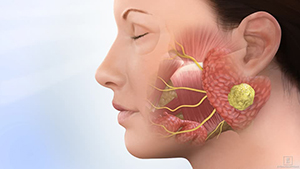Conveniently located to serve San Diego

Salivary gland problems that cause clinical symptoms include obstruction, infection, tumors, and other disorders. If these occur, they can make swallowing and chewing food difficult, increase mouth infections, and worsen your risk for tooth loss and cavities. At ENT Associates of San Diego, salivary gland problems are treated by our board-certified otolaryngologists (ear, nose, and throat doctors) at our three convenient locations in La Mesa, Chula Vista, and Escondido, California.
How Do the Salivary Glands Usually Work?
You have three pairs of major salivary glands: the parotid, sublingual, and submandibular. Each gland secretes saliva into your mouth via tubes, or ducts. Salivary glands produce saliva to moisten your mouth, initiate digestion, and help prevent tooth decay.
Salivary Glands Video
Symptoms of Salivary Gland Problems
A lump or area of swelling near your salivary gland is a common sign of a salivary gland tumor, but that does not mean you have cancer. Most salivary gland tumors are noncancerous (benign). Other symptoms include dry mouth, fever, foul-tasting drainage in the mouth, pain, and trouble opening your mouth.
Causes of Salivary Gland Problems
It’s essential to drink lots of liquids daily, as dehydration is a risk factor for salivary gland disease. Other common causes of salivary gland problems include the following:
- Salivary stones – These crystallized deposits can block the flow of saliva, resulting in swelling and pain. They will continue unless the blockage is removed.
- Bodily infections – The flu, mumps, and other viral infections can cause the salivary glands to swell, resulting in a characteristic appearance known as “chipmunk cheeks.”
- Salivary gland infections – A blocked duct in the mouth often causes this type of bacterial infection. In turn, it causes a lump in the salivary glands and a bad taste in the mouth.
- Tumors – Two of the top tumors that cause salivary gland problems are Warthin’s tumor and pleomorphic adenomas. The former affects the parotid gland, is usually benign, and is more common among men. The latter also occurs in the parotid, minor salivary, and submandibular glands.
- Cysts – The salivary glands may develop cysts due to tumors, salivary stones, infections, or injuries. These cysts can ultimately hinder your ability to speak and eat.
Diagnosis
Our otolaryngologists could decide to order diagnostic testing after conducting a physical exam and reviewing your medical history. They may want to check the salivary gland blocks through a dental X-ray, CT scan, or MRI, depending on how much of the glands they need to see.
Salivary Gland Treatments
Salivary gland disease can be treated medically or surgically. The selection of the treatment plan depends on the nature of the problem.
You might need surgery if you have a tumor in the salivary glands. If the mass turns out to be cancerous, you may need radiation therapy after surgical recovery.
Instead, you would likely be prescribed other special measures to address the disorder’s symptoms. These may include special mouthwashes, antibiotics, or saltwater solutions.
After Salivary Gland Treatment
The recovery process following a salivary gland treatment varies depending on the specific procedure performed. For non-surgical protocols, such as antibiotics and special mouthwashes, patients typically experience improvement within a few days to weeks, with little to no downtime necessary.
Surgical procedures can require a longer healing period, during which patients should follow post-operative care instructions, maintain good oral hygiene, and attend follow-up appointments. Most patients can expect to fully return to normal eating and speaking functions as their recovery progresses, though temporary swelling or discomfort may initially occur.
Benefits of Salivary Gland Therapy
- Relief from pain and discomfort
- Improved ability to chew and swallow
- Reduced risk of oral infections
- Better oral hygiene and dental health
- Restoration of normal saliva production
- Prevention of further complications
Frequently Asked Questions
Contact Us For More Information
Our trained specialists at ENT Associates of San Diego address salivary gland problems with modern, thorough, and compassionate care. Contact us today to schedule your first appointment with one of our esteemed otolaryngologists in La Mesa, Chula Vista, or Escondido.

